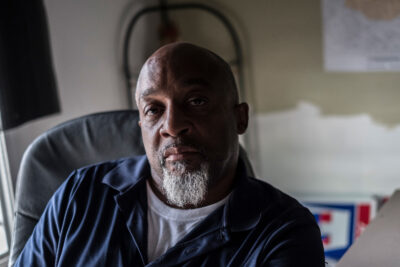This story is a collaboration between ProPublica and New York magazine.
The last weekend in March, Kenneth Glasgow had planned to be in Atlanta strategizing with other Southern organizers about how to help pass the Florida ballot measure that would result in the most sweeping restoration of voting rights for felons in well over a century. A former inmate himself who’d served 14 years for robbery and drug crimes, Glasgow is a pioneer of the felony enfranchisement movement — an Alabama minister and activist whose righteous indignation alone usually exceeds the energy of three people. At the very least, he needed to be back in Georgia by Monday morning to train people from across the country how to go into jails and register inmates to vote. But now he was preoccupied by his other job. “Pastor Kenny,” as he’s known around his hometown of Dothan, is a sort of social-worker-in-chief for the most down-and-out people in one of the more down-and-out places in the Deep South, a mostly black section of the city called “the Bottom.” As it happens, he’s also the half brother and nephew of the Rev. Al Sharpton, a fraught piece of family history that has shaped his life for ill and for good.
That weekend, a close friend who’d been staying at a halfway house run by Glasgow’s small nonprofit, The Ordinary People Society (TOPS), had been charged with assault after a gun altercation. Now, on Sunday night, Glasgow needed to bail the guy out, collect his things from the halfway house and escort him to drug rehab. Before that could happen, however, a 26-year-old named Jamie Townes stopped Glasgow in front of the squat brown duplex that serves as the halfway house. A reputed drug dealer, Townes had a habit of leaving his Monte Carlo running on the street, and he’d gone out around 10 that evening to find that his car had vanished. Townes figured someone had taken the Monte Carlo as a joke — would Glasgow help him find it?
Glasgow agreed, begrudgingly. He said he didn’t know Townes well, but in a neighborhood where many people don’t have cars or driver’s licenses, and public transportation is nonexistent, Glasgow said he carts five to 10 people around every day. “It’s normal for me to take people to get their Social Security card, go to the store, take them to see family,” said Glasgow, who is short and sturdy, with a bald head and a scraggly white goatee. In this instance, “I was like, ‘Ugh, I got to get back to Atlanta, man.’” But if he refused to help, “I’d lose all respect in the neighborhood: ‘What kind of dude are you that won’t take someone to look for a car when you’re the only one around with a car?’”
Except that night Glasgow didn’t have his car — he was borrowing a friend’s, a new black Camry. So he and Townes, along with the man expected back at rehab and his female friend, piled into the vehicle. Within a few minutes, they spotted the missing car as it turned a corner. Its hood was badly crumpled, and it was headed right toward them.
The Monte Carlo hit them hard, clipping the Camry’s driver’s side. Glasgow tried to back up, but something bumped them from behind, he said, as if they’d been tailed by a second vehicle. Now Glasgow really panicked: Were they being ambushed? Had they wandered into a gang war? “Put your head down, put your head down!” he yelled at his passengers. He said he then heard two quick bursts of gunfire. He pressed himself lower in the seat and waited.
The police arrived almost as soon as the shooting ended. Glasgow watched them inspect the Monte Carlo, which had come to a stop 60 yards up the road. Townes was up there as well, talking to a couple of officers. Glasgow said he’d been too busy taking cover to notice the younger man slip out of the car. It was at police headquarters that he learned the identity of the person who’d stolen Townes’ car: a 23-year-old woman Glasgow had never heard of, named Breunia Jennings. Even before taking the car, she’d been acting strangely that day, ranting on Facebook, shaving her head. Now she was dead.
The killer, police said, was Townes; the weapon, a .40-caliber Ruger semi-automatic pistol he’d brought with him when he and Glasgow went hunting for his car. Townes was being charged with capital murder.
So was Glasgow. Under Alabama’s complicity law, anyone who knowingly abets a crime is just as culpable as the person who commits it. The charge was beyond frightening for Glasgow. Capital murder is punishable in Alabama by life in prison or lethal injection, and Houston County not only has the second-highest incarceration rate in the state, but also, as of 2013, had more people on death row per capita than any other county its size (or larger) in the country.

And the murder charges risked hamstringing one of the felony voting rights movement’s most effective leaders at a critical juncture. If Glasgow and his fellow advocates could get Amendment 4 passed in the all-important swing state of Florida, it would be a victory over some Republicans’ efforts to employ a grab bag of tactics to suppress and dilute the votes of blacks, immigrants and liberals. Practically overnight, 1.4 million people would be eligible to cast ballots, one of the largest influxes of new voters since women’s suffrage became the law of the land.
Glasgow moved in a haze of shock as a camera took his mug shot, as he changed into an orange jumpsuit, as a guard pushed him into a cell. He kept thinking: This is crazy. I’m innocent, I’m innocent. But also: You finally got me. You finally got me.
Kenneth Glasgow and Al Sharpton share the same hooded eyes and stubborn set of jaw. But the famous civil rights activist has a sharpness and focus that comes from having money and training and an entourage of natty-suited staffers and handlers to delegate to. Glasgow carries a large and endlessly needy community of people on his back and in his head, and it shows in his perpetual air of distractedness and an eagerness to help and to please that can seem like its own form of neediness.
When Al was in first or second grade, in the early 1960s, his parents, Al Sharpton Sr. and Ada, brought Ada’s 16-year-old daughter from her first marriage to live with them. The girl, Tina Glasgow, had been raised by Ada’s parents, sharecroppers on a farm 25 miles northeast of Dothan. Tina and her stepbrother were fond of each other. She helped young Al, who was already gaining fame as a boy preacher, type out his sermons; he called her “Moma Tina.” But when Al Jr. was nine, his father and Tina were discovered to be having a sexual relationship. The two moved out, and Tina gave birth to Kenneth in May 1965.
Al Jr. and his mother quickly went from living a middle-class existence in Queens — his father was a small-time property owner, “a slumlord, to be honest,” Sharpton wrote in his autobiography “Go and Tell Pharaoh”— to scraping by in a Brownsville tenement. “The people in the churches that used to say, ‘Hey, here comes the boy preacher,’ smiling, were saying, ‘You know what his father did, right?’” Sharpton told me this summer. “I had to live through the shame. I was very bitter.” The shock of sudden poverty changed the course of his ministry. “When we moved into Brooklyn, they didn’t pick up the garbage every day; the police didn’t come when you called them. A lot of my activism was driven by — I saw the difference in ZIP codes.”
Tina and Al Sr. soon split up, and mother and daughter reconciled, to the point that Kenny and Al Jr. would see each other at the uncomfortable family dinners Ada insisted on hosting every week. She liked to regale Kenny with stories about how Al used to line up his stuffed animals and his sister’s dolls and exhort them to accept Jesus into their hearts, so Glasgow did the same. “I’d put out the baby dolls and everything my grandmama had so I could preach to them just like he used to do. Always I wanted to be just like my brother.” But Al Jr.’s fury at Tina and his father kept him aloof. “It was awkward in the sense that Kenny was my nephew and my brother, and I couldn’t say that to him,” Sharpton recalled. “He’s a child. How do you even explain that?”
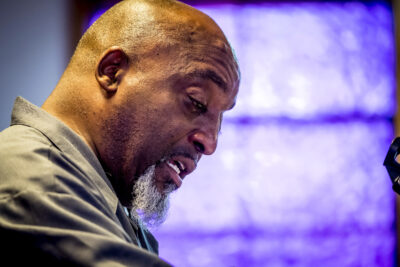
It was Ada who told her grandson the truth about his parentage, when he was around 5. “I couldn’t quite understand what she was talking about,” Glasgow told me. Kenny was small for his age, and his left hand was deformed, two of his fingers little more than stumps. “People used to point at me — ‘That’s him, that’s him over there’ — and I thought they was talking about my fingers, so I used to hide my hand.” Later he realized they were talking about the circumstances of his birth. As he wrote to his brother two decades later, “I was born the bastard child and the curse carried over from generation to generation.”
When Kenny was 12, Tina moved with her son back to Dothan, where her grandfather still lived. For a couple of years, Kenny seemed to be doing fine. Then, as Glasgow tells it, an acquaintance of Tina’s asked Kenny to buy some weed for him. The man turned out to be a narc, and Kenny was arrested. He’d always been a sensitive kid — a “water baby,” he calls himself for his tendency to weep — and the arrest confirmed his worst feelings about himself: “I was born messed up. My fingers messed up. It’s meant for me to be messed up.”
It was the dawn of the crack era. After high school, Glasgow got a decent job as a dogcatcher; he was briefly married and fathered a couple of kids. He started using drugs more often and began cycling in and out of jail, lying to family and friends, increasingly reckless and occasionally delusional, he said.
In those years, the late ’80s and early ’90s, Glasgow and Sharpton had almost nothing to do with each other. Sharpton had founded his National Action Network, and a drug-addict brother was hardly an asset to his political ambitions; in the South, the controversial champion of Tawana Brawley and the Central Park Five was so reviled that Glasgow rarely acknowledged his half sibling. But Sharpton’s influence on him remained powerful. “When I hit [got high], Alfred, I would start preaching!” Glasgow wrote to Sharpton from prison. “Yes, preaching and prophesying. I would visualize Scripture in my mind and see vivid pictures of people’s lives.”
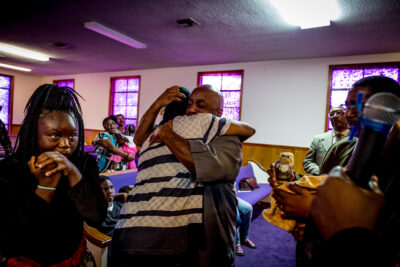
Glasgow spent most of his 14 years behind bars in the Florida state correctional system, much of that time studying history and religion, he said. He gravitated toward Islam, which he found intellectually and spiritually liberating, especially its precept known as zakat — charity — and rose through the ranks to become the Muslims’ top minister in the Polk Correctional Institution in Florida. Then, around 1994, “in the middle of prayer one time, I said, ‘In Jesus’ name,’” Glasgow said, “and all the Muslims looked at me like …” He mimicked an expression of exaggerated horror. “I knew my Muslim days were over.” During a stint in solitary confinement, he read the Bible from cover to cover.
Glasgow and a friend who was serving a life term came up with the idea of the Ordinary People Society in 1994. Glasgow typed up a vision plan: TOPS “will consist of many different outreaches to help people from all walks of life, from the worst criminal to the best Christian.”
On May 23, 2001, he appeared before the Orlando judge who’d presided over his last case. Glasgow was free to go home. In a video he made for TOPS, he summed up those years: “Fourteen different drug cases, two armed robberies, two or three batteries, and one grand theft.” Then he added an important caveat: “That’s my criminal record. That’s not my life record.”
It’s a stifling late-July morning in the Wiregrass, as the region surrounding Dothan is known, for a spindly-bladed native plant that used to be ubiquitous but has mostly disappeared. This corner of the South, where Alabama, Georgia and Florida converge, is largely rural — small towns and peanut fields and thickets of overgrown trees that swarm with gnats. Dothan is the regional hub, surrounded by the usual sprawl of malls and chains. The closer you get to the Bottom, the greater the density of pawnshops and payday lenders.
Glasgow is out on bail while he waits to find out if a grand jury will indict him for murder, and we meet at the rundown shopping plaza where the TOPS headquarters is located. The place is so self-effacing that I keep driving past it even though I’ve visited several times. A few years ago, Glasgow’s now-fiancée, Rodreisha Russaw, who also serves as the TOPS program director, decided to spiff up the offices to make them more welcoming, but the regulars started staying away — anything too nice set a standard they didn’t think they could live up to.
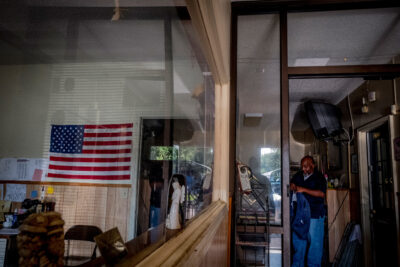
At a gas station down the road, we pick up two large bottles of Coke to keep Glasgow caffeinated and settle his anxious stomach. Then we begin his rounds. Dressed in a gray leisure suit that flaps from his frame like a loose pair of pajamas, he’s juggling three phones — the two he normally carries, plus his son’s. They buzz incessantly on his lap: his mother; his fiancée; his kids; various TOPS staffers and clients; one of his lawyers with a question about strategy; his brother, Al, checking on him.
In downtown Dothan, we drive past the redbrick-and-beige-stone Houston County courthouse, next to the sheriff’s department and a couple of blocks from the police. Their proximity to the main thoroughfare that cuts off the Bottom from the rest of Dothan seems highly symbolic. Even in Alabama, a state known for its pitiless criminal-justice policies and teeming prisons, Houston County has stood out. The racial and class disparities in how justice is meted out in this part of the state “are extremely acute,” said lawyer Bryan Stevenson, author of the best-selling memoir “Just Mercy”and founder of the Montgomery-based Equal Justice Initiative.
Dothan’s jail set bail policies that discriminated against the poor until a 2015 class-action lawsuit, which the city settled, led to reforms. This year, the Southern Poverty Law Center and Alabama Appleseed reported that blacks make up 61 percent of Houston County defendants whose assets are seized by prosecutors. In a 2016 investigation, The New York Times found that Doug Valeska, the district attorney from 1987 to 2017, systematically channeled wealthier defendants into diversion programs that let them avoid imprisonment. (Valeska did not respond to requests for comment.) Meanwhile, minorities and the less affluent often face mostly white juries, long sentences, and crushing fees and fines.
What nearly sunk Glasgow when he returned from prison in 2001 was the $40,000 in child support that had accrued since he’d been locked up. “I fell flat on my face,” he told me. “Got back on drugs, went to messing up.” A warrant for nonpayment of child support sent Glasgow to county jail. He was locked up again almost immediately for an old $200 traffic ticket. “Nobody [in the family] would help me with the [bail] money,” Tina told me this summer as she sat at her computer, going through bank statements. “It was, ‘Oh, he’s just gonna go back to smoking dope.’”
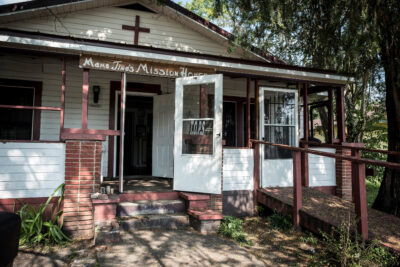
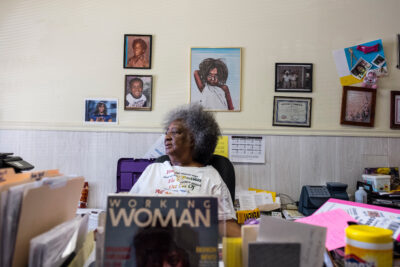
From the beginning, TOPS had the feeling of a do-it-yourself contraption rigged from thrift-store bargains and junkyard parts, powered by the force of Glasgow’s personality and his mother’s faith in him. Building the organization and holding it together gave Glasgow a focus he’d never had before. He began with donated leftover pizza from a restaurant near the card shop where Tina worked and a $2,500 contribution from a local car dealer — later Dothan’s mayor — for a tent where Glasgow could preach. “I called my mama and cried like a baby,” Glasgow said. “No one of that caliber had ever trusted me before.” To his surprise, white evangelical churches were often more receptive to his appeals for help than black ones — they had more money and hand-me-downs to donate and less judgment toward the recipients of their charity. “Many in the black faith community did not want to identify with ex-cons,” Sharpton told me. “Kenny did. Being one himself, he wore it as something outward rather than hiding it, which kind of broke the stigma.”
Not that one of the most famous black preachers in America helped his own prodigal brother much early on, Sharpton admitted. He tended to dismiss his brother’s ministry as being “driven by his own pain as an ex-offender,” he said. Only after he began going to Dothan to visit Ada, by then sick with Alzheimer’s and with Tina as her main caregiver, did Sharpton realize what Glasgow was trying to achieve. “I came down to my mother in the nursing home and Kenny said, ‘I want you to come by and see my spot,’” Sharpton recalled. “And I said, ‘You got a spot?’” Glasgow took his brother to the TOPS headquarters. “That’s when I said, ‘He’s serious.’” But their relationship was too fraught for mentorship, their personalities too similar, and Sharpton thinks Glasgow needed the distance more than he admitted. “He wanted my advice and counsel, but he didn’t want to be overshadowed, to where people said, ‘Oh, he’s just acting like his brother,’” Sharpton told me. “So it’s this dual thing of wanting to know me but not wanting to be overpowered.”
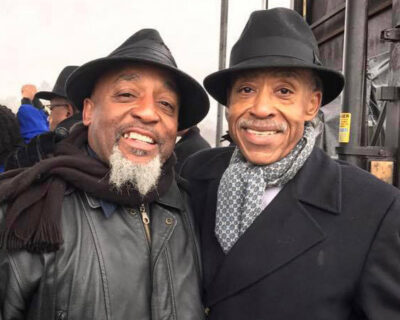
Glasgow operates under the principle that “God never throws anyone away, so TOPS doesn’t either.” The organization’s main mission is to help extricate people from the criminal-justice system and keep them out of its reach. Tina runs a soup kitchen that feeds up to 300 people a day. Glasgow’s oldest daughter, Kenyetta Rich, serves as in-house bail bondsman, ensuring that transient clients make their court dates and pay their fees and fines on time. As for Glasgow, he’s an interrupter, a type of first responder who steps in to resolve conflicts before they escalate and people end up hurt or behind bars. For ex-felons and their families, even minor interactions with law enforcement can be dangerous. “The worst thing you can do is call the police on someone,” he said.
I was riding around with Glasgow one day when he got a call about an argument that had erupted between two women staying at one of TOPS’ other halfway houses. “Okay, now you’re gonna see what I got to deal with all the time,” he said, sighing. We drove a few blocks to a two-story house with an empty pool in the middle of an unkempt backyard. Inside the house, two women were alternately glaring at each other and refusing to make eye contact, while a roommate tried to explain what had happened — something about missing food stamps.
Glasgow gathered them around a kitchen table for what I assumed would be a low-key conversation aimed at calming the situation. Instead, he began arguing loudly with both women, seeming to pit one against the other, exaggerating each one’s complaints about the other’s alleged misdeeds. After 20 or so head-splitting minutes, the dynamic shifted — now the women weren’t mad at each other; they were mad at Glasgow. (“It’s the common-enemy routine,” he told me later. “I get them to start fighting with me.”) As he felt the mood change, he dialed down the decibel level and diagnosed the real problem: The two women were sad and afraid. In the months since their release from prison, they’d been each other’s main supports and closest friends. Now both were transitioning out of the halfway house, returning to families that didn’t particularly want them back or know how to help them. “I’ve seen this happen so many times in prison,” Glasgow told them. “Just before people get out, they pick fights because that way it’s easier to separate.” The women let that sink in. When Glasgow urged them to make peace, they fell into each other’s arms and wept.
When Glasgow got home from prison, in 2001, he tried to register to vote in Houston County, but he was told his felony record in Alabama made him ineligible, possibly forever. Glasgow considered voting to be fundamental in helping ex-offenders reintegrate into their communities — to feel and act as if they had a stake in the future. “I got mad, just to be honest,” he said. “I said, ‘Okay, since you all won’t let me vote, I’m gonna make sure everybody I know can vote.’”
Alabama’s voter-disenfranchisement law was part of the broad post-Reconstruction effort across the South to deny blacks their standing as full citizens. Under the state’s 1901 constitution, no one could vote who’d been convicted of a crime of “moral turpitude,” an undefined phrase that election officials interpreted as a blanket ban applying to almost any felony, from exposing a child to a meth lab to shoplifting to driving under the influence. Only ex-cons who obtained a pardon could regain their voting rights, an onerous and arbitrary process that came to require submitting a DNA sample to the state. Anyone who had outstanding fees or fines was barred from petitioning at all.
Similar laws stripped 6.1 million current and formerly incarcerated Americans of their right to vote in the 2016 election — more than 280,000 of them in Alabama — making felony disenfranchisement “by far the biggest form of voter suppression we have,” said Danielle Lang, an attorney with the Washington, D.C.-based Campaign Legal Center. Those numbers have increased fivefold since the explosion in mass incarceration that began in the 1970s. Today, blacks are disenfranchised at four times the rate of everyone else, according to the Sentencing Project. The state with the most notorious record is Florida, where more than half a million African-Americans, or one-fifth of the state’s black adult population, are barred — and where in 2000 George W. Bush topped Al Gore by just 537 votes to win the White House. This is the law that the state’s voters will have a chance to overturn in two days. If 60 percent of Floridians vote in favor of Amendment 4, the only ex-felons who won’t be allowed to cast ballots will be murderers and sex offenders.
But the barriers to black political participation were just as acute in Glasgow’s hometown; although a third of Dothan’s population is black, the city has never had a black mayor, police chief or school superintendent, and Houston County has never had a black district attorney or circuit judge. While contemplating this reality, Glasgow had an epiphany in the early aughts: “People that’s in jail, that’s got misdemeanors — they don’t have felonies, so they can still vote.” He took the logic a little further: “Wait a minute, what about the people in the county jails that got charged with felonies but aren’t convicted yet? They could still vote, too!” He began going to jails around the Wiregrass, demanding to be allowed to register people awaiting trial, telling the inmates: “These are laws that were written to perpetuate the institution of slavery. If you can’t vote, you are still basically a slave.”
It was an audacious tactic that apparently no one had ever tried. Among Glasgow’s admirers was Stevenson, who’d already won a MacArthur “genius” Award for his work representing death-row prisoners but was still largely unknown outside the criminal-justice world. Glasgow reached out to him as soon as he got out of prison — “‘Could I be a paralegal? A fly on the wall? Could you just mentor me or whatever?’ And he was like, ‘Yeah, come on.’” Glasgow’s perspective was essential, Stevenson said; at that time, there were very few organizations headed by ex-offenders, especially in the South. “He’s really smart and he’s hardworking and he is compassionate,” Stevenson said. But what impressed him most was that Glasgow was “very strategic” — willing to take an incrementalist approach to change and to work with Republicans when necessary — and very persistent. When a bipartisan bill was signed into law in 2003 that made it easier for ex-felons to petition to regain their voting rights, Glasgow himself used the new pardon process to win back what he called his “freedom papers” — and he was so thrilled he wore them around his neck for months.
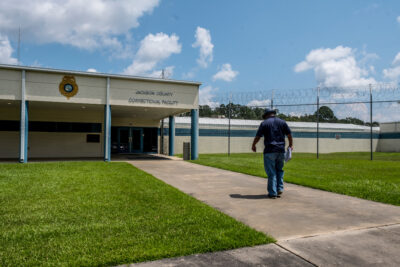
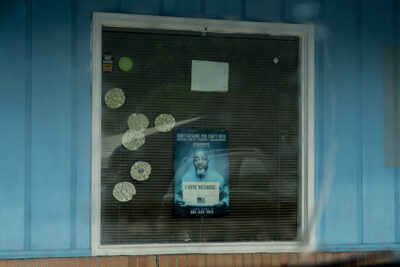
A bigger breakthrough came a couple of years later. In 2005, the state attorney general quietly issued an opinion concluding that the “moral turpitude” language had been interpreted too broadly and that offenses such as felony drug possession, liquor law violations and felony DUI weren’t disqualifying after all. Glasgow and his allies found out about it almost by accident, and he took the news very personally: Because his only Alabama conviction had been for drug possession, “It turned out I never really lost my rights,” he fumed. “I could have voted all along.”
Realizing that thousands of people in prison were similarly entitled without knowing it, Glasgow teamed up with the NAACP Legal Defense Fund, which successfully sued for his right to go into state penitentiaries and register eligible prisoners, just as he’d been signing up people in county jails. In 2008, the issue blew up again. Barack Obama was running for president, and when Alabama Republican Party officials got wind that Glasgow had kicked off a big registration push in prisons, they tried to bar him and his volunteers. The GOP believed Glasgow was focusing on black inmates — i.e., likely Democrats, said Ryan Haygood, then an attorney with the NAACP and now head of the New Jersey Institute for Social Justice. “He actually had a pretty decent number of whites who wanted to get their voting rights back,” Haygood said. “Who knows how they were going to vote?” So Haygood launched another lawsuit, election officials quickly backed down and Glasgow was allowed to resume his prison outreach. Alabama is now one of only three states to allow people in prison to vote. ( Maine and Vermont are the others.)
The climate around felony disenfranchisement has changed dramatically in the past few years. Many conservatives continue to argue that barring convicted criminals from voting is sound public policy — “If you’re not willing to follow the law, then you should not have a role in making the law for everyone else,” the Center for Equal Opportunity’s Roger Clegg and the Heritage Foundation’s Hans von Spakovsky opined in the National Review this year. At the very least, the two argued, automatic restoration was a bad idea: “It makes sense to wait some period of time … to make sure that the felon really has turned over a new leaf.” But even a large nonprofit funded by the billionaire brothers Charles and David Koch has come out in favor of Florida’s Amendment 4, and polls have pegged support at more than 70 percent. The racial dynamics have shifted as well. Although blacks are disproportionately disenfranchised, about two-thirds of those who would regain their right to vote in Florida — nearly a million people — are of other races (something the pro-Amendment 4 ads make clear).
In Alabama, meanwhile, the mostly Republican Legislature in May 2017 finally passed two pieces of legislation Glasgow had long been pushing for. One eased the requirement that people seeking to have their voting rights restored must first pay off all their fees and fines. The second formally limited moral turpitude to 47 felonies, from murder and incest to drug trafficking and forgery, automatically re-enfranchising as many as 76,000 people, the Sentencing Project estimates.
The bills became law just in time for the showdown between Doug Jones and Roy Moore for the U.S. Senate seat vacated when Jeff Sessions became attorney general. And Glasgow’s voter-registration machine went into overdrive: Over a few weeks, he and TOPS volunteers visited 32 jails and prisons and signed up an estimated 5,000 voters. People like 22-year-old Spencer Trawick, of Dothan, who had pleaded guilty to third-degree burglary in 2016 — a conviction that would have disqualified him under the old definition of moral turpitude but not under the new law. “A lot of people, when they get a felony, feel like their whole world shattered, because there’s a lot of things you can’t do,” Trawick said then. The new law offered a glimmer of hope, he suggested: “A lot of people are going to run towards it.”
The effort caught the attention of Breitbart News, which ran a headline alleging that a “Soros Army” was using ex-cons to snatch the election from Moore. The story exploded in the right-wing media, at which point Glasgow, who had indeed received funding from a group Soros supported, said he became the object of new, ferocious ire on social media and on the streets of Dothan. “We’d get random people coming up to us saying, ‘We’re watching you,’” Glasgow’s fiancée, Russaw, told me. “We’d see police across the street with cameras on us. The police would do a lot of stops of people around the Bottom — ‘What do you know about Glasgow?’ We’d get calls we couldn’t trace, people calling him the N-word. They’d try to send different women his way. Women would call asking for him.”
Glasgow already wasn’t a favorite with local law enforcement, due to his tendency to challenge local practices like a one-man Black Lives Matter. “They’re not used to nobody, especially a black ex-felon, ex-crackhead, talking to them like that in Dothan,” Glasgow said. “They’re not used to no black person explaining to them their laws.”

Mario Williams, an attorney from Atlanta who worked with Glasgow on several cases — including a lawsuit on behalf of the family of a 22-year-old Dothan man named Christopher Thomas, who’d been shot to death by police in 2012 — saw how Glasgow would rattle cages. “Kenneth would come in and say: ‘Hey, let me see that complaint. I’m gonna make sure the whole world knows about it, because I’m gonna call my news station,’” Williams said. It got to the point, Glasgow said, where the Houston County district attorney, Valeska, would ask prospective jurors if they knew him or attended his church. (David Jamison, president of the Southeast Alabama Coalition for the Homeless, said this happened to him a couple of years ago when he was up for jury duty at the Houston County courthouse. “I was outraged,” Jamison said. “I was invited as a citizen to be on jury duty. I thought, ‘This is not right.’”
Soon Glasgow was getting slammed for being a media hound, not unlike his brother. “I’d say, ‘He’s getting on the news because if he doesn’t, nobody’s gonna pay attention,’” Williams said. “You write a letter to the city of Dothan about discrimination or some other constitutional violation? They’re gonna ball up that complaint and throw it in the trash can.”
On Dec. 12, 2017, the day of the special Senate election, Glasgow was handing out leaflets with his troops, troubleshooting and driving people to the polls. At one point, precinct workers in Dothan rejected two parolees for lacking proper identification. Glasgow convinced them to accept the men’s correctional paperwork — “I said, ‘Surely, y’all not gonna tell me that their fingerprints and their mug shots and their jail records is not ID.’” Dothan was Moore country, and Glasgow’s crew felt the hostility. “People were harassing us; they were calling us nigger,” he said. By the end of the day, Glasgow was sure they’d lost.
He went home and called Sharpton to commiserate. “He tells me: ‘Keep your head up. You did a great thing today, don’t be discouraged.’” Glasgow was still despairing, the TV turned off, when he received a congratulatory text from his friend Ash-Lee Woodard Henderson, co-executive director of a leadership training institute whose alumni include Rosa Parks and Fannie Lou Hamer. “He called me [back], and he’s just weeping, and he was like, ‘But I thought they called it [for Moore],’” Henderson recalled. The initial predictions were wrong: Late returns from heavily African-American counties — where Glasgow and company had concentrated their efforts — shifted the race toward Jones. He eventually won by a margin of almost 22,000 votes, including 96 percent of blacks.
Four months after Jones won the election, on the morning of April 6, 2018, Glasgow appeared in court for a preliminary hearing on the capital murder charges. The seats were packed with supporters from as far away as New York and California. He sat at the defense table in his orange jumpsuit, his arms and legs shackled, his skin ashen. During his two weeks behind bars, he had been trying to stay calm by doing what he knew: preaching to fellow inmates and registering them to vote. But his distress was evident in the slump of his back and the stony set of his weary face.
In the 17 years since he had left prison, Glasgow had become the most famous civil-rights advocate no one had ever heard of. Now he was in danger of being transformed into the Willie Horton of felony re-enfranchisement. Glasgow’s detractors couldn’t contain their glee. “Is this real?” Donald Trump Jr. crowed, tweeting the Daily Caller story about Glasgow’s arrest. To contain the vitriol, one of the first things Tina asked Sharpton was to stay out of it. “I said, ‘All right,’” Sharpton recalled. “‘But you know good and well that Kenny wouldn’t do nothing like that.’ She said, ‘I know, but let us deal with it.’” For Sharpton, the hardest part was that he didn’t want his brother to feel abandoned all over again. During his own many stints in jail for protesting, Sharpton said: “My father never came and seen me. Never sent word. And I wanted to maybe even that out — for Kenny to know his big brother came for him. Strategically it might not have been the wise thing. But emotionally that’s what I wanted to do. I did not want him to feel deserted.”

At the hearing, Assistant District Attorney Russ Goodman raised suspicion about many of the decisions Glasgow made that night in March: When Townes discovered his Monte Carlo was missing, why hadn’t Glasgow sought help from police? How could Glasgow not have seen Townes get out of the car? After the shooting started, why hadn’t Glasgow tried to flee to safety or to call 911? “He had every opportunity to do something to get out of the situation,” Goodman argued.
At this, Judge Benjamin Lewis, a Republican and former state legislator not known for being particularly friendly to defendants, seemed incredulous. “You think it would have been better for him to flee the scene?”
But the biggest mark against Glasgow was that he’d initially told police that the car’s owner, Joi Williams, had been the driver. He’d called her immediately after the accident, and fretting over whether her insurance would pay for the damage caused by another drive, Williams said she suggested that he tell police she’d been behind the wheel and had wandered off to get help. Meanwhile, Williams would show up and tell investigators the same thing.
Glasgow made a half-hearted effort to pass Williams off as the driver, which he admits was ridiculously stupid and says he never would’ve done had he known someone was killed, but by the time he’d arrived at the police station, he’d told the truth.
After listening to the testimony, Glasgow’s Dothan-based attorney, Derek Yarbrough, was adamant: Police and prosecutors hadn’t offered “a scintilla of evidence” showing his client knew Townes had a gun or intended to commit a crime. Yarbrough noted that the two other passengers in the car hadn’t been charged. “If you’re going to charge somebody with complicity to commit capital murder, every one of them in that car would be guilty.”
The judge seemed somewhat skeptical of the prosecutor’s case as well. “I’m still waiting for what he actually did that made him complicit in the crime itself,” he told the prosecutor at one point. The following week, Lewis issued his order, sending the case to a grand jury for a closer look; meanwhile, Glasgow was free on $75,000 bail.
In late April, I ran into Glasgow at the grand opening of the National Memorial for Peace and Justice in Montgomery, the haunting memorial to lynching and mass incarceration established by Stevenson. Glasgow had been holed up in Dothan, too depressed to do much of anything, but Stevenson had urged him to attend and another donor had paid his way. “It was the first time I got to see him since any of this happened, and I just wanted to give him a hug,” Stevenson told me. “I’m presuming his innocence, and more than that, I’m standing with his character.” Stevenson knew better than most people the danger Glasgow was facing — the zealousness of prosecutors in Houston County, and the difficulties ex-felons face in getting a fair trial. People who’ve spent years in prison tend to feel forever stained, he continued, and “I wanted [Kenny] to know that I know he’s still the same person that I’ve known for a good while now.”
Surrounded by old comrades, Glasgow seemed revived, even ebullient — “How ya doing?” he called, waving to “Orange is the New Black” author Piper Kerman, fresh from moderating a panel.
But back in Dothan, the mood was very different. At the TOPS annual banquet on May 4, Glasgow’s 53rd birthday, the tables were decorated with sunflowers and the chairs were draped with gigantic yellow bows. But the room was half empty — not a big surprise. Some of Glasgow’s allies were “running scared that we’re going to be judged based on the outcome of Kenny,” said his friend, Dorsey Nunn, who heads the California-based Legal Services for Prisoners with Children. Daryl Atkinson, another leader of the movement to help ex-felons reintegrate into society, had signed on as one of Glasgow’s attorneys. He echoed Nunn after a conference call with dozens of advocates for criminal justice reform: “There’s folks on that call today whose organizations are running like roaches.”
Although dapper in a dark suit and bright-blue shirt, Glasgow seemed jittery and disappointed at the poor turnout. He kept ducking out during the speeches, checking his phone in the hallway, and his mother, regal in a black jacket and long skirt, went out to give him a scolding. Later he told me that the fundraiser, a major source of TOPS’ revenue for the year, raised only about $5,000, one-fifth of its usual take.
In the weeks after the preliminary hearing, Glasgow’s lawyers reported that they were hearing that police were asking suspects in other cases if they had any dirt on Glasgow and about his possible involvement with drugs. “Several Dothan police officers have made comments regarding my client and the charges that have been brought against him which are not merely misinformed but are outright false,” Yarbrough wrote to police Chief Steven Parrish, copying District Attorney Pat Jones on the message. Several of the people questioned “felt intimidated or actually threatened by the officers’ words and accompanying actions.”
Jones declined to comment, citing rules of professional conduct. Dothan police Capt. Will Benny defended the handling of the case. The idea that the charges were politically motivated is “just ridiculous,” Benny said. “I can say that in this exact set of facts and circumstances, what we know evidence-wise, anybody else in Mr. Glasgow’s position would have been charged the same way he was.”
The first grand jury came and went in late June, apparently without the case being presented. In mid-July, Glasgow’s daughter Kenyetta was arrested in the parking lot of Southeast Alabama Medical Center, where she had been under treatment for symptoms related to diabetes, and charged with public intoxication; though she wasn’t in her car, it was also impounded. The charges were soon dropped. “I feel like it’s a part of the pattern because everybody knows who my daddy is,” she said.
Later in the summer, Glasgow was leaving his mother’s house, driving his fiancée’s newly purchased Ford SUV, when he was stopped by police, who ran his license plates. The dealer plates came back as stolen, and despite Glasgow’s protests that they were legal, he was arrested on a misdemeanor charge of receiving stolen property. Once again, Glasgow’s face was plastered all over the local news, and Jones’s office moved to revoke his bail.
Then police interviewed the dealer, who confirmed that Glasgow had the right to use the plates. Two hours after seeking a court order to lock him up again, the DA’s office withdrew its demand.
A few weeks later, a second grand jury was convened and adjourned, and while the proceedings are secret, Yarbrough heard rumblings that evidence had been presented in Glasgow’s case, though once again no action was taken. (Townes is in jail — the judge found probable cause and refused to release him on bail — but he hasn’t been indicted either.) I checked in with Glasgow several times over this period. He was agitated, then irate, then resigned, then irate again in the realization that the capital-murder charges could be hanging over his head indefinitely — and that, in the meantime, he and his family and his organization might continue to be under low-grade but constant surveillance. “It hinders your work. … Even if you’re strong enough to deal with it, it hinders anyone who deals with you,” he told me. “It’s psychological warfare.”
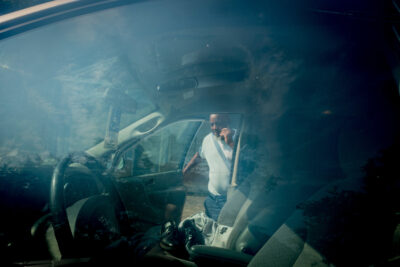
He’d been spending a lot of time in Florida, trying to support the Amendment 4 campaign by registering as many voters as he could, including some in rural jails, and doing community outreach with other groups to make sure those new voters actually cast their ballots. The entire Florida election felt deeply personal. Back in 2007, Glasgow had been one of a noisy contingent of activists who had persuaded then-Gov. Charlie Crist to revamp the clemency process so that regaining the vote for ex-felons would be almost automatic — until the next governor, Rick Scott, jammed the brakes. Now Scott was running for Senate, and Tallahassee’s African-American mayor, Andrew Gillum, was narrowly ahead in a tight race to replace him as governor. Even if Amendment 4 lost, Glasgow said, a Gillum win could save the day. Glasgow had work to do in Georgia as well, where Democratic gubernatorial candidate Stacey Abrams has charged that her Republican opponent engaged in voter-suppression tactics reminiscent of the pre-civil rights era.
Williams has a theory about what’s going on with the pending murder charges, one shared by many of Glasgow’s supporters: Police and prosecutors know they have a weak case and are doing their best to make Glasgow’s life miserable, in the hope that they might find something else to charge him with or that he might make a mistake. “Let’s take ex-convict Kenneth Glasgow and say he’s at it again, he’s gone back to his old ways,” Williams said. “Let’s destroy his reputation so we can decrease the number of people who listen to him, follow him in his march for constitutional rights for disadvantaged people. That’s really the endgame.” (“Mr. Williams is entitled to his opinion,” Benny, the police captain, said in an email.)
Black leaders and activists have always been targeted, Sharpton reminded Glasgow during their daily chats: Martin Luther King Jr., Malcolm X, the Black Panthers, Muhammad Ali and, of course, Sharpton himself (during a 1991 protest over the killing of a black youth by a white mob in Brooklyn, he took a steak knife to the chest). “You chose to answer a calling for leadership,” Sharpton told his brother. “Let them beat up on you, so the victim doesn’t have to be beaten up on.”
Sharpton often recounts a lesson he learned from Ali decades ago, while the two were watching boxers spar at a Pennsylvania training camp — “A champion ain’t just one that can throw a punch.” The real test, Sharpton said, is how well Glasgow takes a punch. “If you get knocked down and get up off the ground, you have the chance to be a champion. But if you don’t, people will remember you as a good puncher, but he had a glass jaw.”
